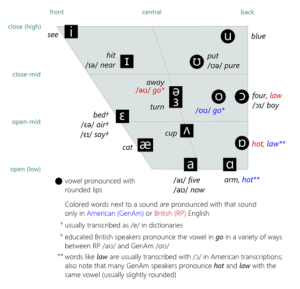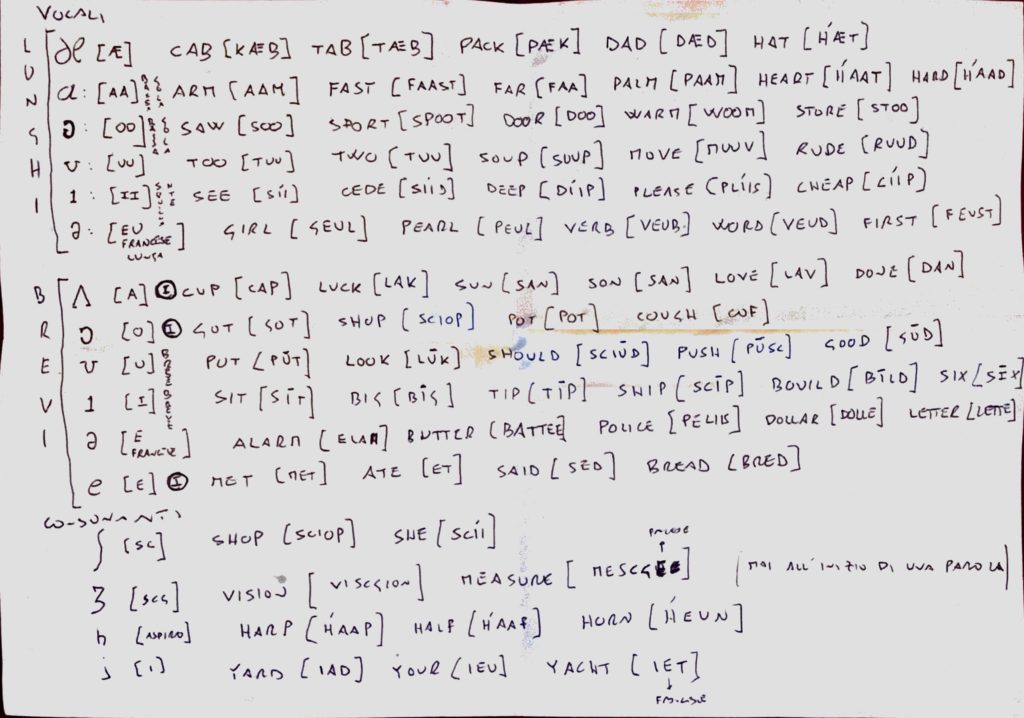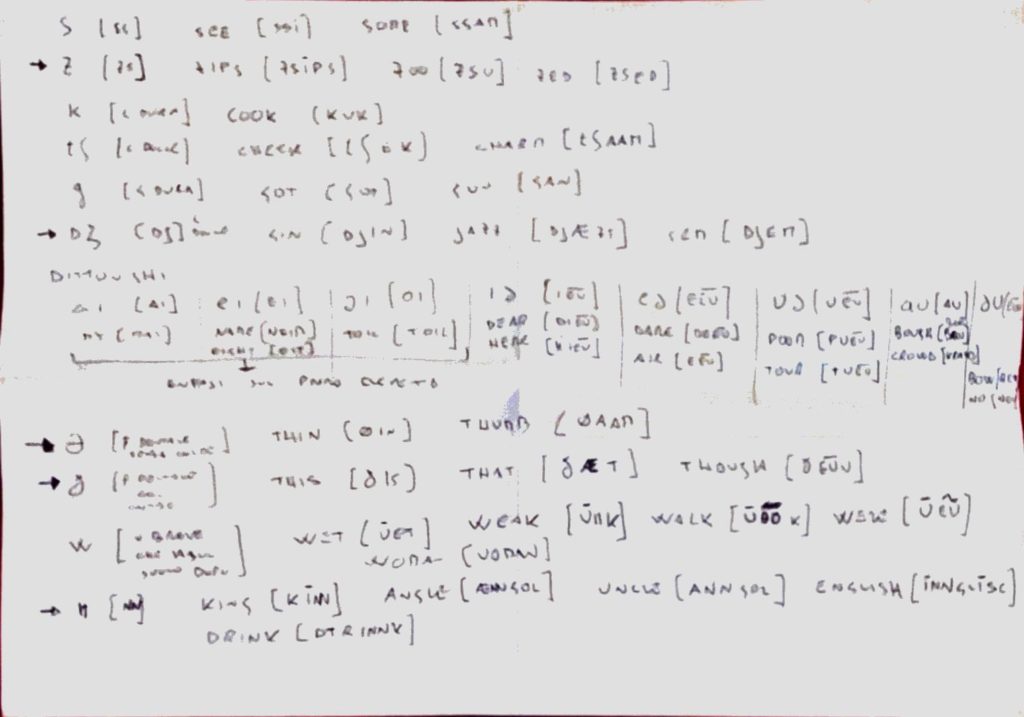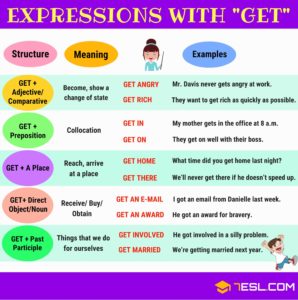FONETICA
| Esempi | Suono | Note | |
| æ | hat [hæt], dad, pack | [ae] | lunga, tra [a] e [e] |
| ą: | far [faa], arm [aam] | [aa] | lunga, bassa gola |
| נ: | sport [spoot], store [stoo] | [oo] | lunga, bassa gola |
| ט: | too [tuu], move [muuv] | [uu] | lunga |
| i: | see [sìi], cheap [sìi] | [ii] | lunga, squillante |
| Ә: | girl [geul], first [feust] | [eu] | lunga, [eu francese] |
| Λ | cup [kap], love [lav] | [a] | breve, [a italiana] |
| כ | got [got], lock [lok] | [o] | breve, [o italiana] |
| ט | put [put], good [ghut] | [u] | breve |
| i | sit [sit], tip [tip] | [i] | breve |
| Ә | alarm [elaam], letter [lette] | [e] | breve, [e francese] |
| e | met [met], ate [eit] | [e] | breve, [e italiana] |

POCO
- POCO (avverbio) + AGGETTIVO o AVVERBIO
- a little / a bit (informale)
- I am a bit tired today (Sono un po’ stanco oggi);
- A little e a bit si possono utilizzare anche con i comparativi per modularne l’intensità.
- a little / a bit (informale)
- POCO (aggettivo) + SOSTANTIVO
- (countable) a few / few;
- (uncountable) a little / little;
- A little e a few hanno un significato positivo (qualche, un po’ di, alcuni);
- Little e few hanno un significato più negativo, di carenza: (pochi, poco);
- Nell’inglese parlato little e few vengono frequentemente sostituiti dall’espressione hardly any (quasi niente, quasi nessuno);
- I have got a few good friends (Ho qualche buon amico);
- I have got a little spare time (Ho un po’ di tempo libero);
- I have got little spare time (Ho poco tempo libero);
- I have got hardly any spare time (Non ho quasi niente tempo libero);
- Forme comparative:
- fewer (meno + countable);
- less (meno + uncountable);
- I have less spare time than you (Ho meno tempo libero di te)
- Forme superlative:
- very few (pochissimi/e + countable);
- very little (pochissimo/a + uncountable);
- I have got very little spare time (Ho pochissimo tempo libero);
- I have got very few friends (Ho pochissimi amici);
- POCO + VERBO
- a little / little / very little ;
- It rained a little yesterday (È piovuto un po’ ieri);
MOLTO
- MOLTO (avverbio) + AGGETTIVO o AVVERBIO
- very
- I’m very tired (sono molto stanco);
- It’s very late (è molto tardi);
- really: veramente; molto utilizzato nell’inglese parlato informale
- extremely: estremamente; usato in modo enfatico.
- quite: piuttosto; un po’ meno forte di very (ma in alcuni casi è anche più forte di very, dipende tutto dal tono e dal contesto in cui viene usato)
- fairly: abbastanza; usato nell’inglese informale, meno forte di very.
- very + sostantivo: this has been my very best work (Questo è veramente stato il mio miglior lavoro);
- very + superlativo: that’s the very thing he needs (È esattamente ciò di cui ha bisogno);
- many può anche essere utilizzato in frasi affermative, specialmente nell’inglese informale
- very
- MOLTO (aggettivo) + SOSTANTIVO
- (frasi affermative, sia countable che uncountable): a lot of/ lots of / plenty of (più del necessario);
- I’ve got lots of books (Ho molti libri);
- (frasi negativa o interrogative): many (countable), much (uncountable);
- I haven’t got many English books (Non ho molti libri inglesi);
- Do you have much spare time? (Hai molto tempo libero?);
- (frasi affermative, sia countable che uncountable): a lot of/ lots of / plenty of (più del necessario);
- VERBO (avverbio) + MOLTO
- (frasi affermative, sia countable che uncountable): a lot
- con i verbi TO WORK e to study si usa frequentemente hard (duramente);
- I’ve worked a lot today (Ho lavorato molto oggi);
- I’ve worked hard today (Ho lavorato duro oggi);
- (frasi negativa): much / very much;
- She doesn’t talk very much (Non parla molto);
- I haven’t worked much today (Non ho lavorato molto oggi);
- (frasi interrogative): much;
- Have you worked much today? (Hai lavorato molto oggi?)
- (frasi affermative, sia countable che uncountable): a lot
ARTICOLO DETERMINATIVO
- The viene pronunciato “the” (dhë) quando la parola che segue inizia per consonante o per acca aspirata
- The viene invece pronunciato “thi” (dhi) quando la parola che segue inizia per vocale o per acca muta*.
- The non si usa:
- davanti ai nomi propri di nazione: France (la Francia);
- davanti ad aggettivi e pronomi possessivi: my book (il mio libro);
- davanti ai titoli di cortesia o titoli nobiliari: Mr. Brown (il sig. Brown);
- davanti a sostantivi che indicano una categoria generica di cose, animali o persone: Dogs (I cani);
- Do you like Chinese food?
- davanti agli aggettivi che indicano una lingua: English (L’inglese);
- davanti a giochi e sport: I like chess (Mi piacciono gli scacchi);
- davanti ai pasti in generale e il sostantivo televisone: Dinner is at 7 o’clock (La cena è alle 7);
- The si usa:
- davanti ai nomi di nazione espressi da nome comune: The USA (gli USA);
- davanti ai nomi di monti o montagne o laghi o fiumi: The Alps (Le alpi);
- davanti a sostantivi che indicato una categoria precisa
- The food on the place was terrible
COMPARATIVO DI MAGGIORANZA (MINORANZA con LESS)
- aggettivi monosillabici: AGGETTIVO+ER:
- I’m taller than my son (sono più alto di mio fratello);
- aggettivi bisillabici: MORE + AGGETTIVO O AGGETTIVO+ER:
- At the junction, follow the narroer path (Al bivio, segui il sentiero più stretto);
- The path to the right is more narrow but less steep (Il sentiero a destra è più stretto, ma meno ripido);
- aggettivi plurisillabici: MORE + AGGETTIVO:
- more interesting (più interessante);
- aggettivi irregolari:
- better, worse;
- much / a lot / far + comparativo
- Travelling by plane is far more expensive (Viaggiare in aereo è molto più costoso);
- a little / a bit / slightly + comparativo
- Mark is a little taller than John (Mark è poco più alto di John);
- sempre più:
- It’s getting colder and colder (Si sta facendo sempre più freddo);
- quanto più… tanto più
- The sooner you leave, the sooner you will arrive (Quanto prima parti, tanto prima arriverai);
- elder (utilizzato per paragonare l’età di membri di una stessa famiglia. Può essere usato solo se seguito direttamente da un sostantivo)
- My elder brother is a teacher (Il mio fratello maggiore è un insegnante);
COMPARATIVO DI UGUAGLIANZA
- as (so in frasi negative) + aggettivo + as + secondo termine di paragone:
- This cake is not as / so good as the cake my grandmother makes (Questa torta non è buona quanto la torta che fa mia nonna)
- Si usa frequentemente il comparativo di uguaglianza in frasi negative, in luogo del comparativo di minoranza
- John is less tall than Mark = John isn’t as tall as Mark (John è meno alto di Mark. = John non è alto quanto Mark);
- very / really / extremely+ aggettivo
- This book is very interesting (Quel libro è interessantissimo / molto interessante);
- con alguni aggettivi che di per sè hanno già senso di superlativo non si usano very a extremely ma absolutely o really
- This cake is absolutely delicious (Questa torta è assolutamente deliziosa)
SUPERLATIVO RELATIVO
- aggettivi monosillabici: THE + AGGETTIVO + EST:
- that is the oldest building in the town (Quello è l’edificio più vecchio della città);
- aggettivi bisillabici: THE + MOST + AGGETTIVO O THE + AGGETTIVO + EST:
- the narrowest / the most narrow.
- aggettivi plurisillabici: THE + MOST + AGGETTIVO:
- the most interesting (il più interessante);
- aggettivi irregolari:
- the best, the worst,the farthest;
- la maggior parte (USO di MOST)
- most people (La maggior parte delle persone);
- talvolta most + aggettivo è utilizzato con il significato di very (USO di MOST):
- it is most interesting = It is very interesting (È interessantissimo / molto interessante
AGGETTIVI
- Tutte le parole che qualificano il sostantivo principale di una frase possono precederlo, senza interposizione di articoli o preposizioni;
- Le parole che si trovano più vicine al sostantivo principale sono quelle a cui si dà una maggiore importanza;
- Precedenza degli aggettivi: dimensione + età + forma + colore + nazionalità + materiale;
- A 400 page book (un libro di 400 pagine)
- libro: sostantivo principale;
- 400 pagine: aggettivo numerale + sostantivo che si comportano da aggettivo quindi precedeno il sostantivo principale e non prendono il plurale;
FORME VERBALI CONTRATTE
- won’t = will not
- i’d = i would
NON VOGLIO
- I won’t = will not => sono sicuro al 100% che non lo farò.
- I don’t want => vorrei non farlo ma potrebbe accadere che lo faccia comunque.
SINCE o FOR
Per indicare da quanto tempo dura un’azione si usa SINCE o FOR
- Si usa SINCE quando si PRECISA IL MOMENTO in cui l’azione ha avuto inizio
- I’ve been here since Christmas [Sono qui da Natale]
- Si usa FOR quando si parla di un periodo lungo nel quale un’azione si svolge
- I’ve lived here for 17 years [Vivo qui da 17 anni]
NOTA: si usa il PRESENT PERFECT infatti si parla di un’azione che inizia nel passato ma che continua nel presente
USI PARTICOLARI DEI DIMOSTRATIVI
- Presentare qualcuno in modo informale:
- John, this is Mike (John, ti presento Mike);
- Si usa that per indicare ciò che qualcuno ha appena detto o che è appena successo:
- Yes, that’s right! (Si, giusto!);
- That is – that is to say… (Cioè…);
- That was a great party! (È stata proprio una bella festa!);
- Informalmente con significato avverbiale:
- It’s this small (È piccolo così);
- It’s that easy (È così semplice/ È tutto qui);
- Al telefono:
- Hello, this is Mike! (Pronto, sono Mike!);
- Hello, that is Susan? (Pronto, parlo con Susan?);
- Al posto di it
- But that’s wrong! (Ma è sbagliato!);
AGGETTIVI E PRONOMI POSSESSIVI E ARTICOLO
- In inglese si usano gli aggettivi possessivi al posto dell’articolo determinativo quando ci si riferisce a parti del corpo:
- Mi lavo le mani–> Lavo le mie mani –> I wash my hands
- Gli taglio i capelli–> Taglio i suoi capelli–> I cut his hair
- Se voglio dire “un mio amico”, non posso far precedere l’aggettivo possessivo dall’articolo A, perchè nessun articolo può mai precedere aggettivi e pronomi possessivi, né posso dire semplicemente “my friend” perché l’articolo sottinteso è THE. Perciò devo ricorrere ad una costruzione alternativa:
- Un mio amico –> Un amico dei miei –> A friend of mine
- Marta e un suo amico –> Marta e un amico dei suoi –> Martha and a friend of hers
- Frase AFFERMATIVE –> There is some milk in the fridge (C’è del latte nel frigo)
- Frase INTERROGATIVA –> quando si OFFRE o SI CHIEDE qualcosa –> Would you like some tea? (Vuoi del tè?)
- AGGETTIVO + sostantivo countable PLURALE;
- PRONOME –> There is some (Ce n’è un po’.)
- E’ usato quando si parla di un numero limitato/definito di cose (in opposizione a any)
- a/one = 1
- a couple = 2
- few = 3
- a few =< 5
- some >5 e <10
- several > 10
- many > 20
WHAT OR WHICH
- what identifies;
- which selects;
WHAT
- Quale?, Quali?, Che? (What floor are the toilets on?)
- Che cosa? Cosa? (What do you think?)
- Quello che, Cio’ che (I didn’t hear what you said)
DOMANDE INDIRETTE
- Quando la domanda é diretta la frase perde la forma negativa (il soggetto torna a precedere il verbo)
- What time is the meeting? (domanda diretta)
- Do you know what time the meeting is? (domanda indiretta)
OUGH CASE
- OUGH-T [‘oot’] (like aw in saw) = dovere;
- R-OUGH [‘raf’] (like u in run) = ruvido/brusco/maltrattare;
- T-OUGH [‘taf’] (like u in run) = duro/difficile;
- TR-OUGH [‘trof’] = depressione/mangiatoia/abbeveratoio;
- TH-OUGH [‘Dəu’] (like o in go) = anche se /sebbene/tuttavia;
- TH-OUGH-T [‘θòòt’] (like o in for) = pensiero/pensato;
- THR-OUGH [‘θruu’] (like oo in too) = attraverso/per;
- THR-OUGH-OUT [‘θruuaut’]= durante tutto/in tutto;
- THOR-OUGH [‘θarə’] like u in run = approfondito/accurato/completo;
- C-OUGH [‘kof’] (like off in offer) = tosse/tossire;
- PL-OUGH [‘plau’] (like ow in flower) = aratro;
- BOR-OUGH [‘barə’] (like u in run) = quartiere / borgo /distretto;
FINALLY
- finally (in ultimo)
- Finally is the same as lastly. It introduces the last element in a series (She has finally got a job)
- at last(finalmente!)
- At last suggests the idea of impatience or inconvenience resulting from a long wait or delay (She has passed her exams at last)
- to the end(alla fine, temporale)
- we have come to the end of the lesson
- in the end
- In the end suggests that something happens after a lot of changes or uncertainty (We made ten different plans, but in the end we went to Goa)
- at the end(alla fine, spaziale)
- At the end refers to position at the end of something (A declarative sentence usually has a capital letter at the beginning and a full stop at the end)
WHO – WHICH – THAT
- who refers to people [É obbigatorio quando l’obiettivo della proposizione relativa non è quello di fare una precisazione sulla persona prima menzionata, ma quello di fornire maggiori dettagli al riguardo]
- which refers to animals or things [É obbligatorio quando viene preceduto da una preposizione come about, without, to, with. É obbigatorio quando l’obiettivo della proposizione relativa non è quello di fare una precisazione sulla persona prima menzionata, ma quello di fornire maggiori dettagli al riguardo]
- that introcuces essential clauses, which introduces nonessential clauses;
- if already exists this,that,these… in essential clause, you may use which;
IMPERSONALE
- Non si fa (That’s not done / One doesn’t do that / You can’t do that);
- Non si dice [“piacere”] (We don’t say [“a pleasure”] / You don’t say [“a pleasure”]);
- Non si dice (We / You / One doesn’t say that / We / You don’t say it like that / That just isn’t said);
- Si usa [+ sintagma nominale, per esempio “il passivo”] (We / You use [the passive]);
- Si usa [+avverbio: molto / spesso / cosi’] (It’s used [a lot / often / like that]);
- Si potrebbe fare (That might be done / That could be done / We / You could do that);
ANCORA
-
- Still gives the idea of ‘continuing’, even at the present moment (I’m still learning);
- Yet gives the idea of ‘up until now’ and is often used in negative and interrogative sentences (I have not received my order yet);
- Already gives the impression that ‘something happened before now’ and is used in affirmative statements (I already done it);
MENTRE
- while (tempo) (uail);
- whereas (in contrasto) (wheras) io vengo mentre questo;
- instead (in alternanza) (insteed) io vengo invece tu vai;
TORNARE
- come back — the direction of movement is here;
- go back — the direction of movement is away;
TEMPI VERBALI – PASSATO
- PRESENTE PERFECT: Jack has done a lot of good things in her lifetime (Jack è ancora in vita);
- PAST SIMPLE: Jack did a lot of good things in her lifetime (Jack putroppo è morto);
- PRESENTE PERFECT: Yes, I’ve seen it (l’ho visto in un tempo non precisato);
- PAST SIMPLE: I saw it last week (l’ho visto in un tempo preciso)
H MUTA (non si deve pronunciarla)
- heir (erede) / heiress (ereditierà);
- honour (onore) / honourable (onorevole);
- hour (ora);
- honest (onesto), honesty (onestà);
SHORT ANSWERS
- You have breakfast at 7, don’t you? Yes, I do
- You had him take the box away, didn’t you? Yes, I did
SINGULARIA TANTUM
- Hair (You will cut your hair once a month)
- Information (I await more information about)
PRONUNCIA ABBREVIAZIONI
- EU (European Union): si pronuncia ii yuu ovvero l’abbreviazione viene pronunciata in modalità lettera per lettera;
- UEFA (Union of European Football Associations): si pronuncia /yuu’eifë/ ovvero l’abbreviazione viene pronunciata come se fosse una normalissima parola inglese;
- Bros (come in Warner Bros): non si pronuncia /bros/ o /bii aa ëu es/ ma /bradhëz/ ovvero l’abbreviazione si legge come la parola non abbreviata;
A CAUSA DI
- ‘Due to’ it’s neutral and used with nouns (The rain is due to a depression);
- ‘Owing to’ it’s neutral and used with verbs (It is raining owing to a depression);
- ‘Because of’ can only be used with a noun, and is slightly less formal;
PRONUNCIA DI -EAR
- dear(s) (caro), ear(s) (orecchio), fear(s) (paura) feat (impresa), gear(s) (ingranaggio), hear(s) (sentire), near(s) (vicino), rear(s) (posteriore), tears (lacrime), sear(s) (scottare), year (anno);
- bear(s) (orso/i), pear(s) (per/ea), swear(s) (giurare), tear (lacrima), wear(s) (indossare) ;
CERCARE/TROVARE
- SEARCH dà l’idea di cercare qualcosa SCRUPOLOSAMENTE, ad esempio la polizia che registra una stanza per trovare un’arma, quindi senza trlasciare nulla;
- LOOK FOR viene spesso utilizzato quando si è PERSO qualcosa o si ha BISOGNO di qualcosa;
- SEEK è riferito solitamente a qualcosa di ASTRATTO (tipo “I’m seeking a job”, ma non è nel linguaggio comune quindi viene spesso sostituito con look for);
CASA
- HOME: to where someone lives;
- HOUSE: to refer to a building;
AS SOON AS (appena, non appena)
- Dopo ‘as soon as’ non si mette moi il verbo ol tempo futuro (The Embassy will ring you as soon as your passport IS ready-L’omboscioto ti chiomerò oppeno il tuo possoporto sorò pronto)
COMPLEMENTO INDIRETTO DOPO IL VERBO (E SENZA PREPOSIZIONE)
- ll complemento indiretto è preceduto da una preposizione: Our travel agent found a room FOR US (ll nostro agente di viaggio ha trovato una camera per noi).
- ln inglese è molto comune porre il complemento indiretto dopo il verbo; in quel caso si elimina la preposizione TO o FOR:
– Our travel agent found US a room
– I’m writing JOHN a letter (Quindi attenzione a non dire: “found for us a room”, oppure, “writing to John a letter”)
BY
- indica una scadenza: By 5 o’clock (Per/Entro le 5)
- indica prossimità: By the entrance (Vicino all’ingresso)
- mezzi di trasporto: By train (in treno)
- autori di libri/canzoni..: It’s by Dante (é di Dante)
- per mezzo: Let’s start by listening (partiamo con l’ascoltare)
MUST
- Da usare per ORDINI e CONSIGLI
- It’s a great film. You really must see it (È un film meraviglioso. Devi davvero vederlo)
- You must try to get to work on time, Miss Jones (Deve cercare di arrivare al lavoro puntualmente, signorina Jones)
GENITIVO SASSONE
- La forma possessiva viene usata per lo più quando il “possessore” è una persona o un essere animato,.o in espressioni che indicano un tempo delerminato. Neqli altri casi, cioè con cose inanimate, si uso lo costruzione con of come in italiano.
- The Wilsons‘ dog/The Rob‘s dog (Il cane dei Wilsons/Il cane di Rob)
- Yesterday‘s meeting (La riunione di ieri)
- What was the name of that street? (Qual’è il nome di questa strada?)
TELL or SAY (Dire)
- Tell è seguito da complemento, sostantivo o pronome senza alcuna preposizione
- Say si usa quando non è espressa la pesona cui si parla o per introdurre il discorso diretto. Quando SAY è seguito dal complemento bisogna aggiungere TO
- Tell me you love me (Dimmi che mi ami)
- What does that sign say? (Coso dice quel cartello?)
- It says: “No smoking” (Dice: “Proibito fumare”)
- What do you say to a young child when.. (Cosa dici a un bambino quando..)
INFINITIVE OR GERUND
- Si usa il gerundio se il verbo precede una preposizione:
- How about going to a play?
- Do you feel like going to a movie?
SPEAK or TALK (Parlare)
- Speak si uso per situazioni formali e talk quondo si ha una certa familiarità
- Can I speak to you when you have a moment?
- Sorry darling, I can’t talk to you now.
MUST or TO HAVE (Dovere)
- Quando in una frase il verbo “dovere” non esprime un obbligo, bensì una SUPPOSIZIONE o una DEDUZIONE, si traduce con MUST
- Working in a hospital must be difficult for Helen
THAT or WHICH/WHO (Che)
- THAT should be used to introduce a restrictive clause.
- WHICH (or WHO) should be used to introduce a non-restrictive or parenthetical clause.
- My car that is blue goes very fast.
- My car, which is blue, goes very fast.
EVERY or EACH
- We use each to refer to individual things in a group or a list of two or more things.
- we use every to refer to a group or list of three or more things
TO GET
- TO GET + complemento oggett diretto = OTTENERE, RICEVERE, COMPRARE
- I got my passport last week. (ottenere/prendere)
- She got her driving license last week. (ottenere/prendere)
- I got a letter from my friend in Nigeria. (ricevere)
- He gets $1,000 a year from his father. (ricevere)
- She got a new coat from Zappaloni in Rome. (comprare/prendere)
- We got a new television for the sitting room. (comprare/prendere)
- TO GET + espressione di luogo = raggiungere, arrivare in un posto
- How are you getting home tonight?
- What time will we get there?
- When did you get back from New York?
- TO GET + aggettivo = DIVENTARE, presentare un CAMBIAMENTO di STATO
- I am getting old.
- It’s getting hotter.
- By the time they reached the house they were getting hungry.
- I’m getting tired of all this nonsense.
- My mother’s getting old and needs looking after.
- It gets dark very early in the winter.
- Don’t touch the stove until is gets cool.
- TO GET + preposizione/avverbio:
to get at essayer d’exprimer I think I see what you’re getting at. I agree. to get away with échapper a une punition I can’t believe you got away with cheating on that test! to get by se débrouiller (financièrement) Sam doesn’t earn much, but we get by. to get down déprimer, rendre triste, descendre This rain is really getting me down. to get off descendre d’un véhicule We got off the train just before the bomb exploded. to get on 1. monter dans/sur un véhicule ou un animal
2. s’entendre avec quelqu’un1. He got on his bicycle and rode down the street.
2. Amy and I really get on well.to get on with procéder I have so much homework, I’d better get on with it. to get out of éviter quelque chose, surtout un devoir She got out of the washing-up every day, even when it was her turn. to get over se remettre (d’une maladie, d’une surprise) Have you gotten over your cold yet? to get through consommer entièrement We’ve got through all the sugar. Can you buy some more? to get up se lever du lit He gets up at 6.00 a.m. every morning. to get up to faire des bêtises The children are very quiet. I wonder what they’re getting up to. - TO GET + preposizione/avverbio:
- Do you get it (capire) Do you get what the teacher was explaining in class?
- He’s getting dinner tonight (occuparsi della cucina) You can relax. It’s my turn to get dinner tonight.
- I’ll get the bill (invitare) Put your wallet away! I’ll get the bill.
- That really gets me! (infastidire) It really gets me when my sister shows up late.
- To get rid of something (liberarsi) I’m going to get rid of all these old newspapers.
- To get out of bed on the wrong side (alzarsi dal letto) He got out of the wrong side of the bed this morning.
- To get your own back (vendicarsi) She’s getting her own back for all those rude things you said at the party last night.
ORA
- Half past eleven / Eleven thirty [Sono le undici e mezzo]
- A quarter to eleven / Eleven fifteen [Sono le undici e un quarto]
- A quarter past eleven/ Eleven forty-five [Sono le 11 e un quarto]
- Noon / Midday [Mezzogiorno]
- Midnight [Mezzanotte]
VERBI PIU IMPORTANTI
Infinitive Past tense Past participle
- feel felt felt
- forget forgot forgotten
- find found found
- give gave given
- go went gone
- have had had
- keep kept kept
- know knew known
- lose lost lost
- make made made
- mean meant meant
- meet met met
- send sent sent
- take took taken
- teach taught taught
- tell told told
- understand understood understood
VERBO PIU ING OR TO
- Often we use -ing for an action that happens before the first verb or at the same time:
- They denied stelaing the money (stealing <— denied)
- I enjoy going out (going <– enjoy)
- Often we use to… for an action that follows the first verb:
- They decided to steal the money (decided -> to steal)
- I want to go out (want -> to go)
- Regola
PHRASAL VERB (verbo composto, verbo + avverbio/preposizione)
- Quando il verbo é transitivo il pronome si inserisce tra il verbo e l’avverbio/preposizione
- Can you put ME through
- I’ll send it up immediately
USED TO / GET USED TO
- I used to vote conservative. Now I don’t vote at all [Una volta votavo per i conservatori. Adesso non voto affatto]
- I’ll never get used to the terrible way Americans make cofee [Non mi abituero’ mai al modo terribile di fare il caffé degli Americani]
ARTICOLO ‘THE’
L’articolo determinativo ‘THE’ NON viene usato quando si parla di qualcosa in GENERALE
- Traffic is a problem in big cities [ll traffico è un problema nelle grandi città (in generale: senza articolo]
- The traffic in Rome is a huge problem [ll traffico a Roma è un gronde problema (in particalore: con articolo]
VERBI CON DUE OGGETTI (INDIRETTO E DIRETTO)
Verb + compl. indiretto + compl. diretto => l’oggetto indiretto generalmente fa riferimento a una persona e arriva per primo:
- I gave him (complemento indiretto) a watch (complemento diretto) for his birthday
- Could you send me the report?
- I will lend you some money
I verbi Explain, Suggest, Describe NON ACCETTANO questa struttura (compl. indiretto + compl. diretto:
- I would like you to explain this theory to me (NOT I would like you to explain me this theory.)
- Can you suggest a good cardiologist to me? (NOT Can you suggest me a good cardiologist?)
I verbi Teach, Tell, Pay, Show, Sing, Play, Write accettano entrambe le costruzioni: Verb + compl. diretto oppure Verb + compl. indiretto
- I asked Peter. (Here the verb asked is followed by an indirect object.)
- I asked a question (Here the verb asked is followed by a direct object.)
I verbi Sing, Play, Write + to + compl. indiretto (prima del compl. indiretto bisogna aggiungere TO)
- Write me a letter. (NOT Write to me a letter.) (To is not used when write is followed by a direct object.)
- Write to me. (NOT Write me.) (Here we use the preposition to because the verb write is not followed by a direct object)
Alcuni verbi che hanno 2 oggetti posso avere 2 FORME DIFFERENTI nella forma ATTIVA che nella forma PASSIVA
- Give (ask, offer, teach, tell, lend, promise, sell, throw)
- Active: He gave me the book / He gave the book to me
- Passive: I was given the book (by him) / The book was given to me (by him)
– GAP FILLERS
– ING FORM (list of verbs):
- admit, appreciate, avoid, carry on, consider, defer, delay, deny, detest, dislike, endure, enjoy, escape, excuse, face, feel like, finish, forgive, give up, can’t help, imagine, involve, leave off, mention, mind, miss, postpone, practise, put off, report, resent, risk, can’t stand, suggest, understand
– TO-INFINITIVE (list of verbs):
- afford, demand, like, pretend, agree, fail, love, promise, arrange, forget, manage, refuse, ask, hate, mean (= intend), remember, begin, help, need, start, choose, hope, offer, try, continue, intend, plan, want, decide, learn, prefer
– DIRECT-OBJECT + TO-INFINITIVE (list of verbs):
- advise, hate, like, persuade, request, ask, help, love, prefer, teach, challenge, instruct, need, recommend, tell, choose, intend, order, remind, want, forbid, invite.
- They want me to go to Germany with them
– HATE, LIKE, LOVE, PREFER :
- would or should + TO-INFINITIVE
- other cases: TO-INFINITIVE (emphasis more on results of the action) OR ING FORM (emphasis on the process itself)
– FEEL, NOTICE, SEE, HEAR, OVERHEAR, WATCH
- ING FORM or INFINITIVE (WITHOUT TO)
- I heard someone shouting / I saw you dancing
- I heard people shout / I saw him dance
– WILL…DO
- Will my driving license do? (E’ sufficiente la mia patente di guida?)
- Will 20 bottles do? (Basteranno 20 bottiglie?)
– ONE/A HUNDRED or ONE/A THOUSAND
Si una ONE quando si vuole definire una cifra più precisa
- I’ve got a hundred things to do (Ho cento cose da fare)
- My grandfather came to America exactly one hundred years ago
–
- –
- –
–
- –
- –
–
- –
- –



